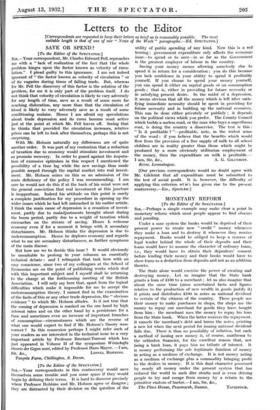[To the Editor of the SPECTATOR.]
SIR,—Your correspondents in this controversy would save themselves some trouble and you some space if they would begin by defining their terms. It is hard to discover precisely where Professor Robbins and Mr. Hobson agree or disagree ; they are distracted by their division on the question of the utility of public spending of any kind. Now this is a red herring: government expenditure only affects the economic issue—to spend or to save—in so far as the Government is the greatest employer of labour in the country.
Saving your money means allowing somebody else to spend it in return for a consideration ; you do this because you lack confidence in your ability to spend it profitably yourself. If you choose to spend your money yourself, you can spend it either on capital goods or on consumption goods ; that is, either in providing for future necessity or in satisfying present desire. In the midst of a depression, it seems obvious that all the money which is left after satis- fying immediate necessity should be spent in providing for future necessity and in building up the national resources. This can be done either privately or publicly ; it depends on the political views which you prefer. The County Council which builds a useless road, or the man who buys a superfluous coat, is doing the country a disservice. The test is this : " Is it profitable ? "—profitable, note, in the widest sense of the word : if you believe that the benefits which would flow from the provision of a free supply of milk to all school children are in reality greater than those which might be produced by a more obviously utilitarian employment of the money, then the expenditure on milk is profitable.— [Our previous correspondents would no doubt agree with Mr. Gilchrist that all expenditure must be submitted to the test of social profit. It is, however, the difficulty of applying this criterion has given rise to the present controversy.—En., Spectctor.]






























 Previous page
Previous page